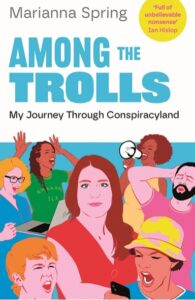In the beginning…

This is Gougane Barra, one of the most magical places in Ireland. It’s where the river Lee starts its journey to the sea on the South coast beyond the city of Cork. My first summer job involved walking the upper reaches of the river in 1965 as part of a government survey of potential salmon spawning grounds. It was a wonderful summer, and my first paid employment. One of those experiences one never forgets.
Quote of the Day
”Failure is the condiment that gives success its flavor.”
- Truman Capote
Musical alternative to the morning’s radio news
Randy Newman, Mark Knopfler and friends | It’s Money That Matters, Splendid Isolation and Dirty Boulevard
Video concludes abruptly. Sorry about that.
Long Read of the Day
The Science Fiction of the 1900s
An extraordinary essay by Karl Schroeder that stopped me in my tracks.
Here’s how it begins:
The future is terrifying. It wasn’t supposed to be.
I grew up during the cold war and I remember sitting around with friends in high school talking about what we would each do in the 10 to 20 minutes we’d have left after the nuclear attack sirens went off. I remember the sound of those sirens when they were tested; it wasn’t a theoretical discussion. We seriously expected that moment to come, and soon. If it didn’t, we thought humanity would burst through the horror into a new era of peace and prosperity for all.
We’re still terrified today. We can all list the uncertainties and threats that circle our fragile society like wolves in the night. Our fear isn’t greater now than when I grew up; still, it’s different. The despair of helplessness in the face of climate change, of fascism rising like Dracula from its coffin; of resource overshoot and political decay, all feel different to me than the instant nuclear annihilation I was promised as a kid. Part of that difference, I think, is that nuclear war was a binary thing: it would happen, or it wouldn’t. And if it didn’t, then science fiction laid out a future we could look forward to.
Now I’m going to make a terrible accusation…
Do read on. It’s worth it. Among other things, it makes you see Elon Musk in an interesting light.
Books, etc.

My review of an interesting and worthwhile book.
Marianna Spring is the BBC’s first disinformation and social media correspondent, a post best described as prolonged recumbence on a bed of very sharp nails. She is also a plucky and dogged investigative reporter who has repeatedly dived into the cesspit of online hatred and misinformation with the aim of trying to understand, rather than merely ridicule or condemn it. For her pains, Spring has already received – and deserved – some professional awards. But she has also been the target of some of the most vicious targeted attacks that any journalist has had to face: of the 14,488 social media posts targeting staff that the BBC logged between January and June 2023, for example, 11,771 related to her. Any journalist who can endure such an onslaught and remain sane deserves respect.
Among the Trolls is her compelling account of what the dark underbelly of contemporary liberal democracies looks like now. Much of it involves conspiracy theories – those who believe them and those who profit from them. But Spring’s gaze widens into an exploration of the collateral damage such theories cause, not only to individual believers and their families but in the way they undermine the deliberative capacity of democracies. She looks at the way technology has created a world in which, as Jonathan Swift famously put it, “Falsehood flies, and the Truth comes limping after it” – but one in which even blatant falsehoods endure long past their sell-by date because the internet never forgets. And she recounts, in graphic and depressing detail, the unspeakable things that people do and say online. But she also makes some heroic attempts to contact the trolls behind the slurs, sometimes with really interesting results…
My commonplace booklet
How heavy is a neutrino? Race to weigh mysterious particle heats up
Years ago I read an interesting short story, the title of which is lost in the mists of memory. It was about a writer who comes up with a really implausible plot for a novel. He checks it out with a literary friend who says that it’s so crazy that nobody would take it seriously — except perhaps a particle physicist. Why? “Because those guys believe in the neutrino, a subatomic particle that can pass right through the earth without pausing.”
I filed that away and never found a use for it until yesterday when I came on this article in Nature about serious physicists combining to find how much this weird piece of subatomic dust weighs.
“Observations of cosmic structure at the largest scales suggest that neutrinos are extremely light, with masses of, at most, 0.12 electronvolts — four million times smaller than the mass of an electron.”
Sometimes, science is wonderful. And expensive.
Linkblog
Something I noticed, while drinking from the Internet firehose.
- A German digital nomad who — legally — lives all the time on trains. Hard to believe but, it seems, true. Wonder how long he’ll keep it up. Link
This Blog is also available as an email three days a week. If you think that might suit you better, why not subscribe? One email on Mondays, Wednesdays and Fridays delivered to your inbox at 6am UK time. It’s free, and you can always unsubscribe if you conclude your inbox is full enough already!




